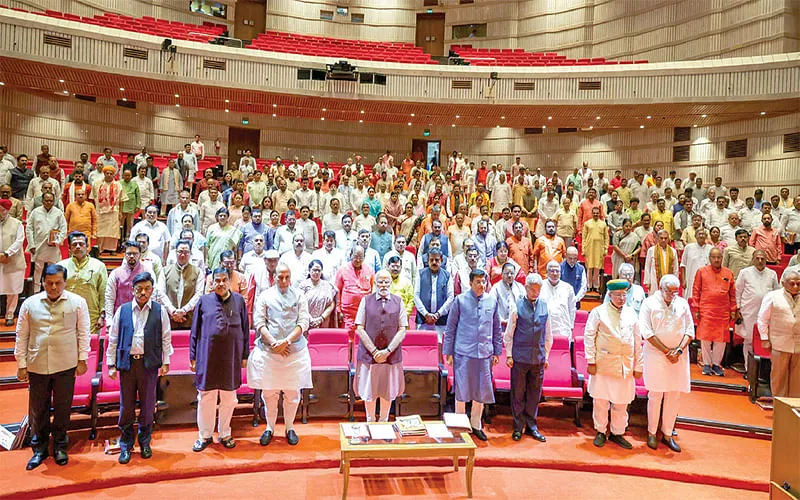The G7—US, Britain, Italy, France, Germany, Canada and Japan and the European Union which also participates in its meetings—is certainly one of the most influential global groups for its members are the most advanced countries of the world. Its collective decisions have an impact on global politics, economics and commerce; hence, the group’s annual summits are closely watched by observers of international affairs.
This year’s summit was held on June 26-28 in Germany. India, Argentina, South Africa, Senegal and Indonesia were invited to attend the event. Prime Minister Narendra Modi represented India and held a wide range of bilateral meetings with other participating leaders. He also addressed a session dedicated to Food Security and Gender Equality and another session on Climate, Energy and Health. Taken together the subjects covered by these sessions dealt with the most pressing issues of our times.
This G7 summit convened under the shadow of Russia’s continuing invasion of Ukraine. All G7 states have taken very strong anti-Russia positions and are assisting Ukraine to meet the Russian challenge. In a statement on “Support for Ukraine” the group committed itself to “continue to provide financial, humanitarian, military and diplomatic support and stand with Ukraine for as long as it takes”. The question which naturally arises is ‘as long as it takes for what’?
Russia has clearly failed to achieve its initial war aim of quickly occupying sufficient territory in central Ukraine and also, probably, Kiev, and thereby dislodging President Volodymyr Zelensky’s government. Its objective was to put in place a pro-Russia regime in Kiev which would do away with the national desire to join NATO. That has not happened. Consequently, Russia now seeks to control eastern and southern Ukraine and greatly limit Ukraine’s access to the seas. It is making steady progress to achieve this aim. The G7 ‘Support for Ukraine’ document states “We reiterate our demand that Russia put an end to this war of choice, and immediately, unconditionally cease all hostilities and withdraw its troops and military equipment from the entire territory of Ukraine within its internationally recognised borders”.
Unless defeated in war or financially so completely crippled by the sanctions that the people revolt against the government, Putin is certainly not going to give up the territory Russian forces have gained till now or may do so in the future. Neither is it possible for Ukraine even with tremendous G7 and NATO military support to defeat Russia. And, China’s economic and commercial support will ensure that Russia is able to keep its head above water. Thus, as matters stand, any future arrangement will have to take these factors into account. The G7 statement mentions that “It is up to Ukraine to decide on a future peace settlement, free from external pressure or influence”. However, once the G7 and NATO have stated that they are committed to the maintenance of Ukraine’s territorial integrity and that Russian forces must withdraw from all of Ukraine, no government in Kiev will easily accept the permanent loss of a part of the country. The hope in the early days of the war that an agreement between Kiev and Moscow could be reached soon is now gone. Hence, it now seems that the Ukraine conflict will not end any time early.
The G7 knows that the Russian invasion has changed the dynamics of the European order. Turkey has lifted its objections to Finland and Sweden joining NATO they will become members of the alliance. Besides, the EU has agreed to a candidate country status for Ukraine. What the G7 are now seeking to ensure is that the China and Russia between themselves do not completely erode the established world order which has been consistently upheld by the Western powers. These countries under the leadership of the US put the current world order in place after the Second World War. The end of the war witnessed the beginning of the end of colonialism with the independence of India.
Both the Summit Statement and that on Ukraine focus on world order. The latter in terms of the damage Russia has done to it through its invasion of Ukraine and the former on the dangers to it on account of China’s aggressive policies and actions in the South China Sea. The Ukraine statement notes that Russia’s action “seriously undermines the international rules-based system that underpins global peace, prosperity, and security”. The Summit Statement calls on China to “fully comply with the arbitral award of 12 July 2016 and to respect navigational rights and freedoms enshrined in UNCLOS”. It also urges “China to uphold its obligations under international law and contribute to international security”. Clearly, neither Russia nor China are willing to accept the restrictions of the principles of the present world order if the pursuit of their national interests so demand. The fact is that the principles of world order such as non-interference in the internal affairs of states has been violated by all powers including the United States whenever their interests so required. They however, tried to find a cloak of legitimacy even if that was only a fig leaf. The difference with Chinese and Russian approaches is that they are showing no real interest in covering their actions with fig leaves.
Most significantly the Summit Statement concedes that China’s cooperation is needed to address the current global challenges including climate change. Countries like India that have difficulties with China need to note this important point. It may constrain the G7 to really take on China even while it continues to make much noise that China’s disdain for the principles of the current world order is unacceptable.
Disclaimer: The views and opinions expressed in this article are the personal opinions of the author. The facts, analysis, assumptions and perspective appearing in the article do not reflect the views of GK.







